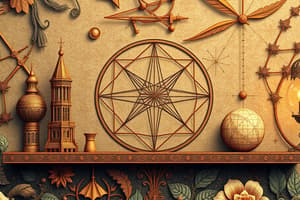Podcast
Questions and Answers
Which branch of mathematics deals with the study of variables and their relationships?
Which branch of mathematics deals with the study of variables and their relationships?
- Calculus
- Number Theory
- Algebra (correct)
- Geometry
What is the study of counting and arranging objects in different ways?
What is the study of counting and arranging objects in different ways?
- Combinatorics (correct)
- Probability
- Algebra
- Geometry
Which mathematical concept is a collection of unique objects?
Which mathematical concept is a collection of unique objects?
- Equation
- Set (correct)
- Function
- Inequality
What is the process of rearranging and simplifying mathematical expressions using rules such as the commutative, associative, and distributive properties?
What is the process of rearranging and simplifying mathematical expressions using rules such as the commutative, associative, and distributive properties?
Which branch of mathematics deals with the study of change and motion?
Which branch of mathematics deals with the study of change and motion?
What is the study of triangles and the relationships between their sides and angles?
What is the study of triangles and the relationships between their sides and angles?
Which mathematical concept is a relation between a set of inputs and a set of possible outputs?
Which mathematical concept is a relation between a set of inputs and a set of possible outputs?
What is the study of chance and uncertainty, including events, experiments, and probability distributions?
What is the study of chance and uncertainty, including events, experiments, and probability distributions?
Flashcards are hidden until you start studying
Study Notes
Branches of Mathematics
- Arithmetic: The study of numbers and their operations, including addition, subtraction, multiplication, and division.
- Algebra: The study of variables and their relationships, often expressed through the use of symbols, equations, and functions.
- Geometry: The study of shapes, sizes, and positions of objects, including points, lines, angles, and solids.
- Calculus: The study of change and motion, including limits, derivatives, and integrals.
- Number Theory: The study of properties of integers and other whole numbers, including primality, divisibility, and congruences.
- Combinatorics: The study of counting and arranging objects in different ways, including permutations and combinations.
Mathematical Concepts
- Sets: A collection of unique objects, known as elements or members, that can be anything (numbers, letters, people, etc.).
- Functions: A relation between a set of inputs (domain) and a set of possible outputs (range), where each input corresponds to exactly one output.
- Equations: Statements that express the equality of two mathematical expressions, often containing variables and constants.
- Inequalities: Statements that express a relationship between two mathematical expressions, such as "greater than" or "less than".
- Proofs: A logical and systematic way to establish the truth of a mathematical statement or theorem.
Mathematical Tools and Techniques
- Algebraic Manipulation: The process of rearranging and simplifying mathematical expressions using rules such as the commutative, associative, and distributive properties.
- Graphing: The visual representation of mathematical relationships using coordinates and graphs.
- Trigonometry: The study of triangles and the relationships between their sides and angles, including sine, cosine, and tangent.
- Probability: The study of chance and uncertainty, including events, experiments, and probability distributions.
Famous Mathematicians and Contributions
- Euclid: Known as the "Father of Geometry", developed the axiomatic method and wrote the famous book "Elements".
- Isaac Newton: Developed calculus and laws of motion, laid the foundation for classical mechanics.
- Archimedes: Made significant contributions to geometry, calculus, and engineering, including the discovery of pi.
- Pierre-Simon Laplace: Developed probability theory and the nebular hypothesis of the origin of the solar system.
Branches of Mathematics
- Arithmetic is the study of numbers and their operations, including addition, subtraction, multiplication, and division.
- Algebra is the study of variables and their relationships, often expressed through the use of symbols, equations, and functions.
- Geometry is the study of shapes, sizes, and positions of objects, including points, lines, angles, and solids.
- Calculus is the study of change and motion, including limits, derivatives, and integrals.
- Number Theory is the study of properties of integers and other whole numbers, including primality, divisibility, and congruences.
- Combinatorics is the study of counting and arranging objects in different ways, including permutations and combinations.
Mathematical Concepts
- A set is a collection of unique objects, known as elements or members, that can be anything (numbers, letters, people, etc.).
- A function is a relation between a set of inputs (domain) and a set of possible outputs (range), where each input corresponds to exactly one output.
- An equation is a statement that expresses the equality of two mathematical expressions, often containing variables and constants.
- An inequality is a statement that expresses a relationship between two mathematical expressions, such as "greater than" or "less than".
- A proof is a logical and systematic way to establish the truth of a mathematical statement or theorem.
Mathematical Tools and Techniques
- Algebraic manipulation is the process of rearranging and simplifying mathematical expressions using rules such as the commutative, associative, and distributive properties.
- Graphing is the visual representation of mathematical relationships using coordinates and graphs.
- Trigonometry is the study of triangles and the relationships between their sides and angles, including sine, cosine, and tangent.
- Probability is the study of chance and uncertainty, including events, experiments, and probability distributions.
Famous Mathematicians and Contributions
- Euclid developed the axiomatic method and wrote the famous book "Elements", earning him the title "Father of Geometry".
- Isaac Newton developed calculus and laws of motion, laying the foundation for classical mechanics.
- Archimedes made significant contributions to geometry, calculus, and engineering, including the discovery of pi.
- Pierre-Simon Laplace developed probability theory and the nebular hypothesis of the origin of the solar system.
Studying That Suits You
Use AI to generate personalized quizzes and flashcards to suit your learning preferences.




